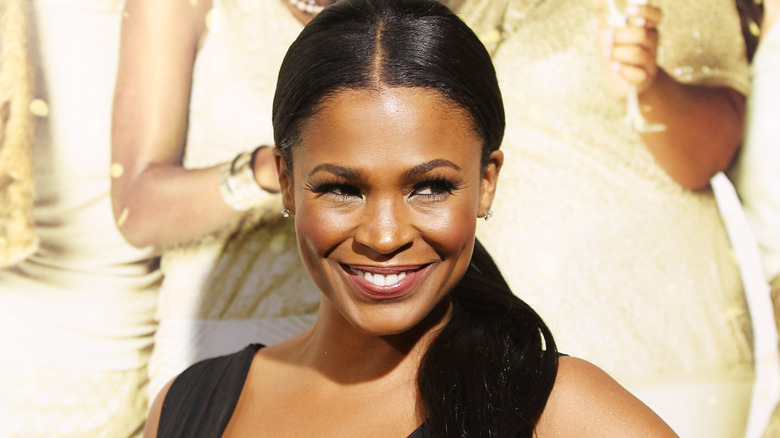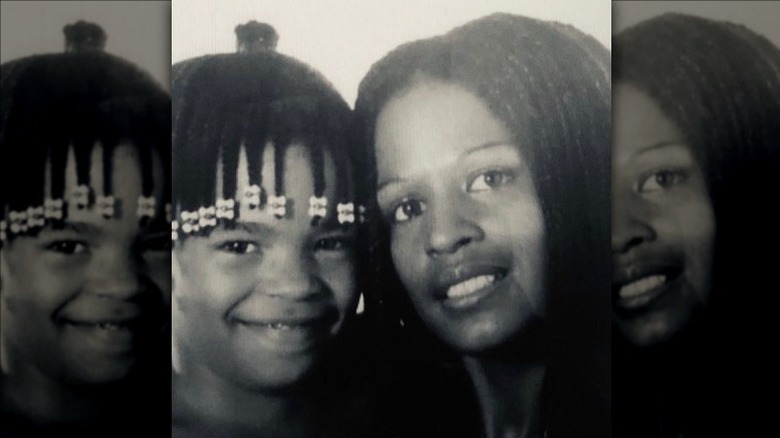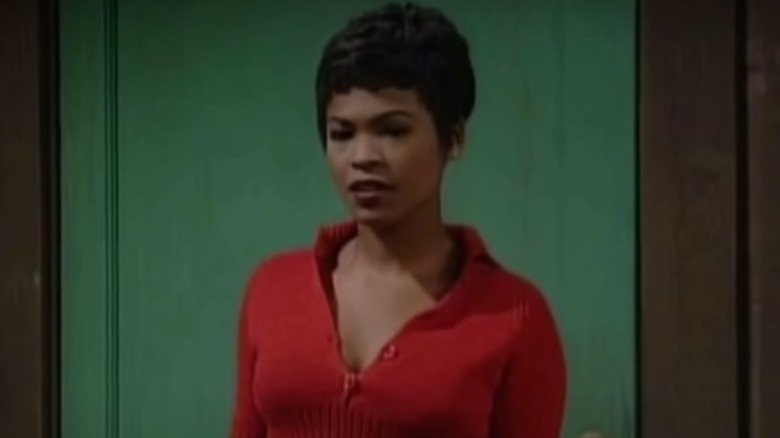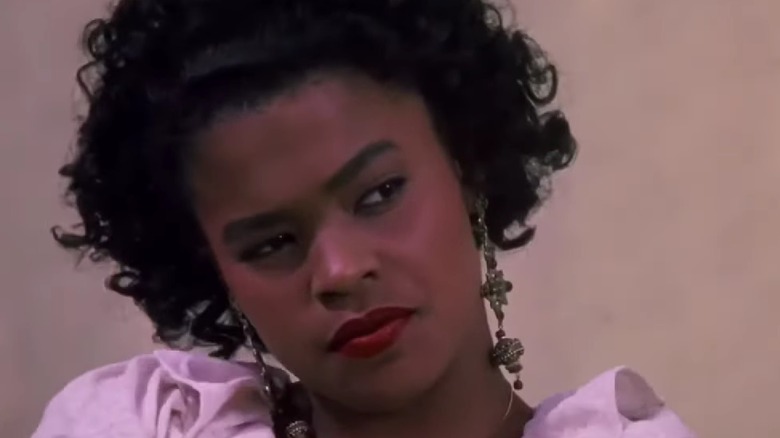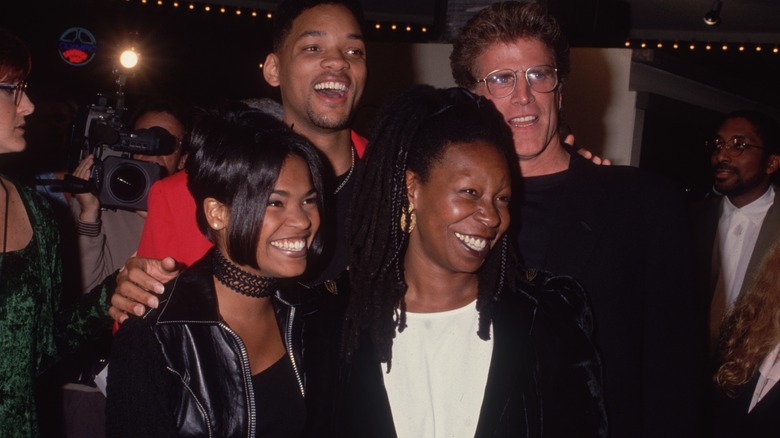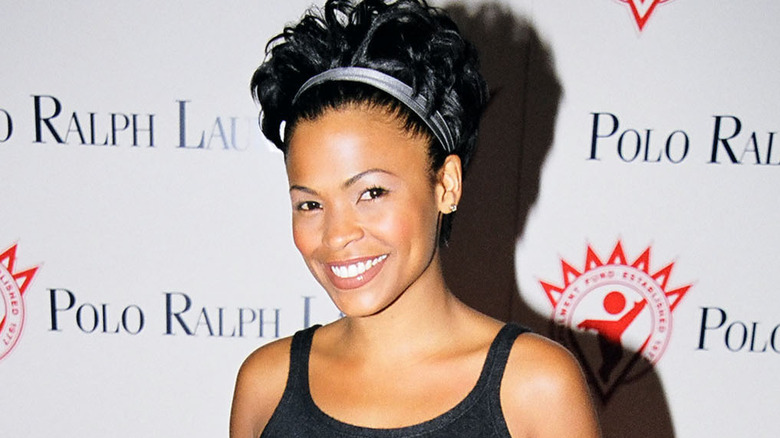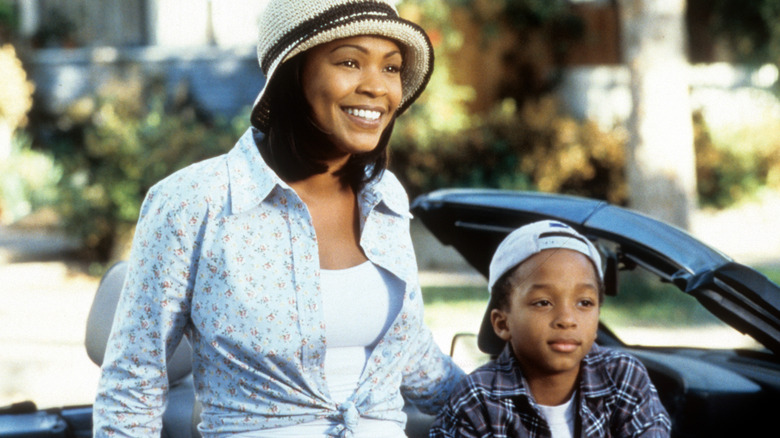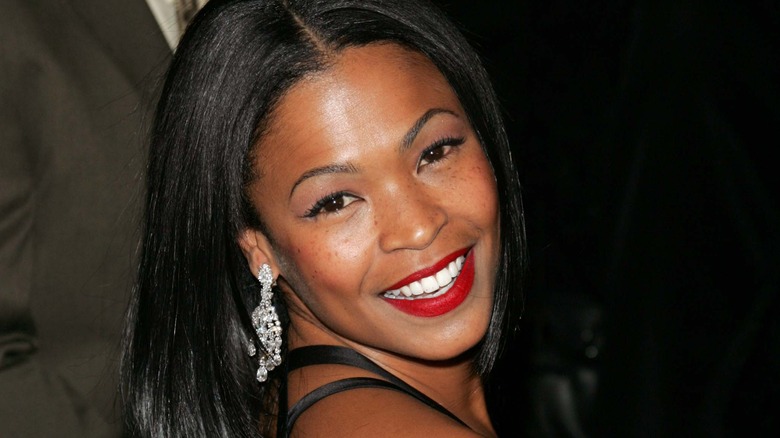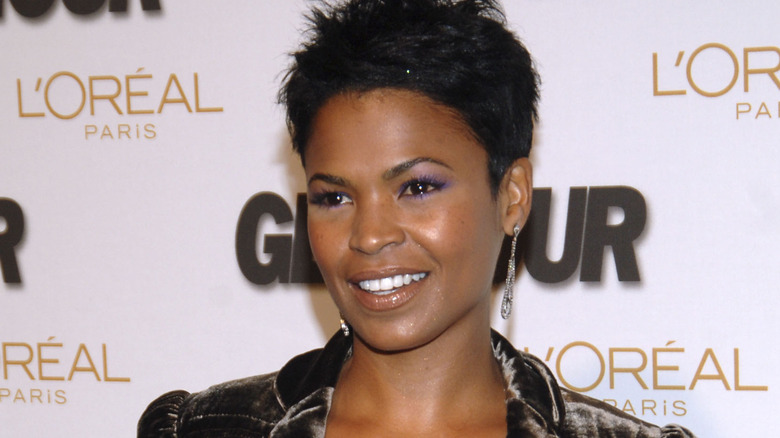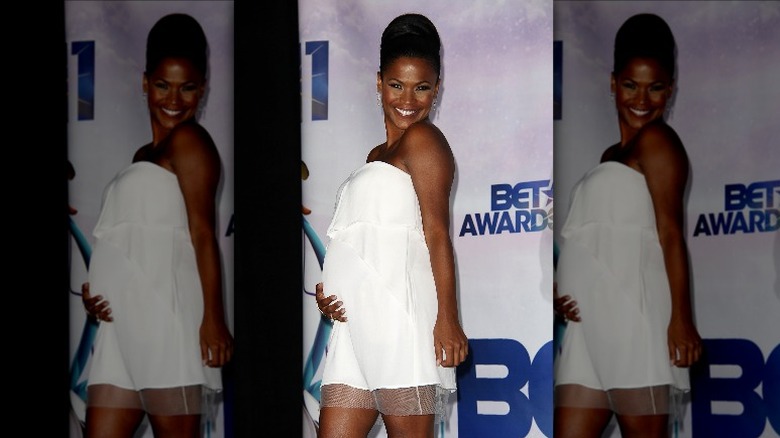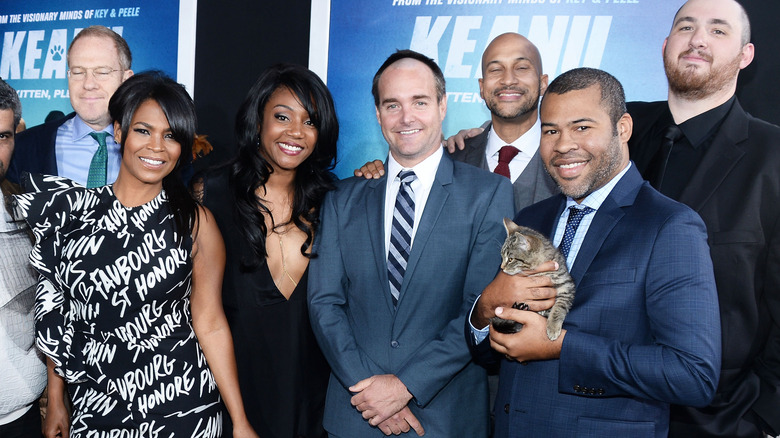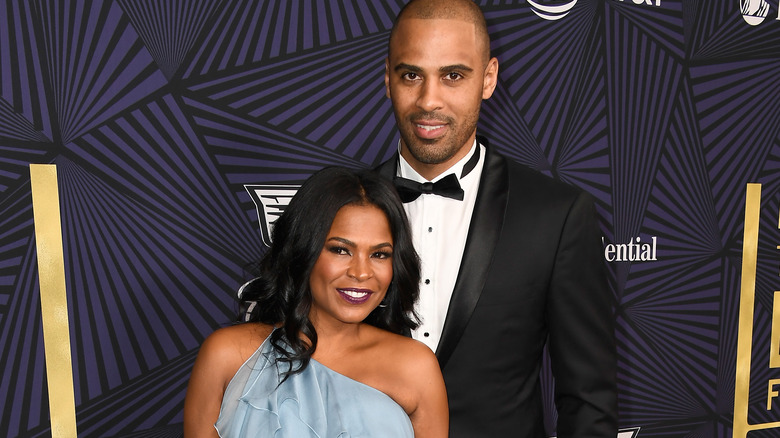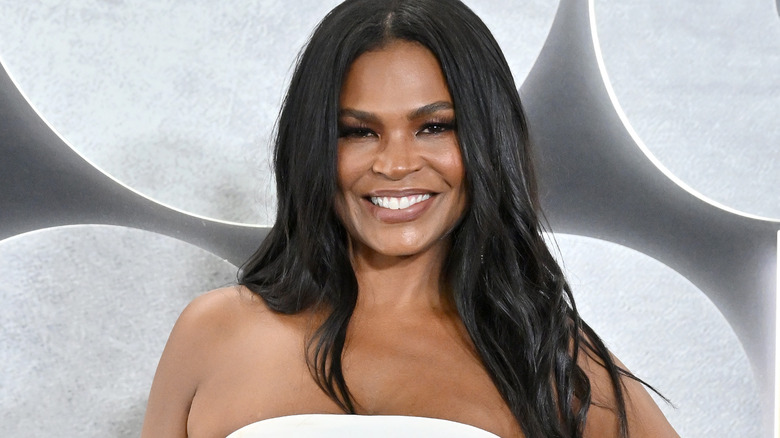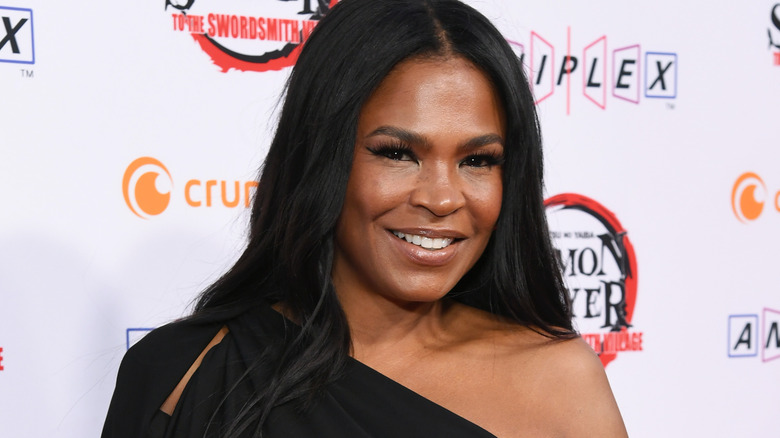The Complete Evolution Of Nia Long
Often defined as a '90s queen, Nia Long made a name for herself in classic sitcoms and era-defining films of the decade. And the actor was as much a staple of the time as she was a cultural icon. With the ubiquity of pop culture nostalgia, not to mention the return of '90s fashion trends in all their oversized and garish glory, Long serves as a reminder of a seemingly more innocent era. Few can conjure, for instance, her iconic sleeveless turtleneck and baggy overalls ensemble from "The Fresh Prince of Bel-Air" without being overwhelmed by warm and fuzzy memories. But Long would be the first to admit that the decade for which she remains the most famous was far from innocent.
For all her remarkable achievements, the actor has had to contend with the misogynoir of Hollywood and the consequent bigotry of studio heads. Throughout it all, however, she has held her head high and persevered, in turn lending her name to passion projects close to her heart in more recent years.
Accordingly, Long, who is something of a Benjamin Button-esque figure in her inability to age, is no longer defined by her work three decades ago. A household name among Gen X, Millennials, and Gen Z alike, she has a rarely found cross generational appeal that will no doubt endure in years to come. Let's find out what makes the actor tick and what thoroughly ticks her off as we take a look at the complete evolution of Nia Long.
As a child, Nia Long strived for success
Nia Long was born in Brooklyn in 1970. Two years later, her family moved to Iowa, where she faced racist abuse. In an interview with The Cut, she discussed her discomfort at being one of the few Black children at her Midwestern school. She was bullied by the white children, who chased her home and hurled racist slurs. "Those things really happened," she said. "But the beauty in that is when I faced certain things as an adult, I wasn't affected as deeply. I knew how to handle myself." She and her family then moved to South Central Los Angeles, where she felt welcomed by the Black community and learned about different types of cuisine (Long herself is of Caribbean descent and was hitherto unfamiliar with Southern delicacies).
Since she was a child, Long exhibited a highly ambitious streak. Although her mother never pressured her to become a star, instead nurturing her daughter's talents, Long felt compelled to make it big so she could support her. "At a young age, I was very serious about becoming successful and making things better for my mom," she told the Los Angeles Times in 1993. "She sacrificed everything so that I could study whatever I wanted–acting, gymnastics, guitar, ballet, tap."
Subsequently, she began acting in plays before scoring her first role via Disney's "The B.R.A.T. Patrol" in 1986. Thereafter, as with many stars, she kickstarted her career thanks to popular soaps, starring in "Guiding Light."
Nia Long started out on The Fresh Prince
Nothing screams peak '90s nostalgia like "The Fresh Prince of Bel-Air." Being an icon of the era, it comes as little surprise that everyone's favorite kaleidoscopic, meme-generating sitcom starred Nia Long. She made her debut appearance on the show in 1991, playing Claudia in the Season 2 episode "She Ain't Heavy." Years later, she became a series regular, but played a different character entirely: Will's long term girlfriend and eventual bride-to-be, Lisa. The role was initially supposed to go to Jada Pinkett, but she was deemed too petite to act alongside the towering Will Smith. "The joke that I have with Jada is that I got the job but she got the husband," Long quipped in a sit-down with People.
In an interview with Yahoo! Entertainment, she conceded that the sitcom provided her with the skills she needed to prep for a career in both TV and film. "Those were good old days... I was actually working every day and learning what it meant to be on a show with three cameras versus film where there's one camera," she said. She spoke fondly of her co-star and friend, Smith, whom she described as a perpetually happy sneakerhead.
Chatting to Bustle, she said that the show was ultimately the catalyst for her present day fame. "I was young and I was new... [Being on the show was] the beginning of so many wonderful things that happened in my life and in my career," she mused.
She began scoring gritty film roles
Testament to her status as a reigning '90s queen, Nia Long also starred in another classic of the era: "Boyz N the Hood." She played Brandi, the levelheaded and supportive girlfriend of protagonist Tre (Cuba Gooding Jr.). While the role remains one of her most famous, it almost didn't materialize.
Initially, she was hesitant to star in the 1991 film because she assumed writer-director John Singleton was a white man co-opting Black culture. "I was like, 'I can't,'" she told Yahoo! Entertainment. "I didn't wanna go because I honestly thought, 'Who is the white guy writing a movie called "Boyz n the Hood"?' That's what I thought. I'm gonna be totally transparent. And my agent was like, 'No, you have to go.'" At her audition, she was pleased to discover that Singleton was in fact Black, so she gleefully took on the role.
Having witnessed poverty and violence firsthand when growing up in South Central, the film resonated with Long on a profound level. As such, she could identify with Tre, whose father (played by Laurence Fishburne) does all he can to steer his son away from a life of crime. "I grew up seven blocks away from where we filmed 'Boyz N the Hood,' so that was my reality," she told the Los Angeles Times in 1993. "I've had friends who were killed in drug-related incidents and drive-bys, and if my mother hadn't been behind me, I'd probably still be living there."
Nia Long was soon mingling with A-listers
In 1993, Nia Long was cast in the dramedy "Made in America," playing Zora, the daughter of Whoopi Goldberg and sperm donor Ted Danson (the latter's identity is only uncovered after Zora undergoes a blood test). In an interview with Bobbie Wygant, Long disclosed that the depiction of a teenage girl desperate to find out who her dad is resonated with her. Having been raised by a single mom, she revealed that it took her years to forge a strong bond with her father. "I didn't really develop a true relationship with my father... until I was like 18, you know?" she said. In an otherwise lukewarm review of the film, the Austin Chronicle praised Long as a standout rising star.
Two years later, she was reunited with her "Boyz N the Hood" co-star Ice Cube for another '90s classic: "Friday." The film, which is famed for spawning the meme "Bye Felicia," led to a pivotal turning point in Long's career trajectory. She had all too often been cast as the supportive girlfriend or the passive goody-two-shoes.
With the release of "Friday," Long told the Los Angeles Times in a 1995 profile, it was time to take on more substantial and multifaceted parts. "I'm in the process of changing a lot of people in my circle and getting that team together to really push me and take my career to the next level," she explained, "'cause I know I'm just one project away."
Becoming a film franchise queen
As any MCU star knows, all it takes is one franchise to really kickstart a lucrative career. Though not quite the money-making machine that is the aforementioned franchise, the "Best Man" film series provided Nia Long with steady work across three decades. In 1999, she starred in the first and titular installment of the series, which saw her play Jordan Armstrong, the ambitious ex of Taye Diggs' protagonist.
The film was directed by Spike Lee's cousin, Malcolm D. Lee, and critics have pointed out the subtle similarities between the two directors' works. Incidentally, Long had previously praised Spike for opening doors for Black filmmakers in Hollywood. Chatting to BuzzFeed, Long said she relished the project as it was a departure from many of the Black-centered films of the era, many of which she regarded as reliant on cultural stereotypes. "Because in the '90s, we were telling these hood stories, which were just as equally as important, but there was also a whole group of people that weren't being represented," she explained. "So, it's just nice to be able to represent a part of who we are collectively."
She reprised the role in the 2013 sequel "The Best Man Holiday" and the 2022 Peacock series "The Final Chapters." Speaking to The Cut about returning to the franchise, Long said that she could both identify with and learn from Jordan. "She chose herself," she mused. "Which is a lesson I had to learn big time in my life."
Big Momma's House propelled her to international stardom
By the early 2000s, Nia Long was on her way to becoming a household name. At the turn of the millennium, she was cast in queer classic "If These Walls Could Talk 2" as a character altogether more disparate from her earlier acting roles. In the TV movie's "1972" segment, she played feminist Karen, the disapproving and arguably transphobic roommate of Michelle Williams' protagonist, Linda. Long was nominated for an NAACP Image Award for her performance.
In addition to exhibiting her serious acting chops via roles in gritty dramas and TV movies, Long is adept at demonstrating her silly side. One of her most commercially successful movies is "Big Momma's House," also released in 2000, which took home $56 million at the box office (its 2006 sequel raked in nearly $67 million internationally).
The franchise saw her return to traditional love interest roles, something that the star was all too aware of. Speaking to Black Film following the release of the sequel, Long acknowledged that existing as a woman in Hollywood often meant being reduced to an object of male desire. However, she said that she was determined to have a varied and eclectic acting career. "I'd like to do a period piece or something a little bit more dramatic, a little bit more challenging, not so together; not so perfect," she added. "Not that anything I've done is perfect but someone who's a little bit lost. Just a darker character."
Her work on Third Watch became too heavy at times
Nia Long's desire to take on more serious work was fulfilled when she was cast as police officer Sasha in Season 5 of NBC crime drama "Third Watch" in 2003. The substantial role was the welcome change she had been so eagerly anticipating. Speaking to Entertainment Weekly, she admitted that she had hitherto felt stagnant as an artist. "I was the It Girl," she said. "If there was a black girl in an urban film, that was my job. ... [Y]ou want to be challenged. I thought, 'The only way I'm going to break the glass ceiling and have the opportunity to do some different types of roles is to step back and take a look at my game plan."'
She snagged two NAACP Awards for her work on the series, winning the gong for Outstanding Actress in a Drama Series in 2004 and 2005.
Eventually, however, the gritty themes of the show led to Long desiring some escapism. Subsequently, in 2005, she balanced the heaviness of the role with a return to comedic work, once again reuniting with Ice Cube for family caper "Are We There Yet?" "I haven't done a comedy for a while," she told MovieHole, "and this was a lot of fun to do, especially since Ice Cube had to do most of the work... It's an old-fashioned family comedy with me as the straight gal but looking a bit more glamorous than on TV."
Losing out on major roles due to systemic racism
As more revelations and allegations surface regarding racism in Hollywood, many actors have been empowered to finally speak their truth. Nia Long was one such star who faced racist discrimination, in turn losing out on profitable parts.
There have been false claims that Long turned down the role of Alex in the 2000 "Charlie's Angels" reboot, but in a 2020 interview with Insider, she set the record straight once and for all. The actor disclosed that she was deemed too old in comparison to Drew Barrymore, a sentiment that she believes was little more than a racist dog whistle. "I love Drew Barrymore, I think she's amazing, but I think that was just a nice way to say you're a little too Black," she stated. "Personally, that's what I think. Because if you notice there were no brown skin [actors]. I mean, honestly, I would have been the blackest thing in the film." Elaborating on the incident in her sit-down with Yahoo! Entertainment, she said that she was ultimately glad she starred in "Big Momma's House" in lieu of "Charlie's Angels," as Martin Lawrence seeks to uplift Black performers.
She later appeared on "The Drew Barrymore Show" to address the controversy, telling the host that she didn't blame her for what transpired. "I'm 101% positive that it came from a studio exec that has no concept and understanding of the importance of diversity, let alone what you stand for," Long emphasized.
Nia Long was thrilled to have a baby in her 40s
An increasing number of women are having kids later in life. Having first become a mother at the age of 30, giving birth to son Massai in 2000, Long became a mom for the second time when she was 41. In 2011, she and her partner, former Celtics basketball coach Ime Udoka, welcomed their son Kez. The pregnancy was unplanned, with Long being both stunned and elated by the news. "I was supposed to go to Ghana to do a film ... I had a doctor's appointment to get the yellow fever shot and they were like, 'Miss Long, we can't give you a shot,'" she revealed at the BET Awards, per Us Weekly. "I almost fainted. It was the best moment and the sweetest surprise ever."
During her pregnancy, she appeared nude on the cover of Ebony magazine, recalling Demi Moore's famous pregnancy shoot for Vanity Fair. The actor told the outlet that she faced sexist and ageist backlash due to starting a family in her 40s. "Society tells us 'Get married before 30,'" she said. "I think if we just take our time as women, and do what comes natural to us and for us, we would make fewer mistakes."
In her interview with The Cut, she sought to dispel myths about becoming a mother later in life. "When it happened, it was pretty exciting," she revealed. "I think we should talk about it."
Fanboys Key and Peele were eager to cast Nia Long in Keanu
Testament to her ability to adapt to the changing cultural climate, Nia Long lent her name to a project starring a defining duo of the 2010s: Keegan-Michael Key and Jordan Peele. Hot off the success of their irreverent sketch show "Key & Peele," the comedic partners starred in the 2016 kitty-themed crime caper "Keanu," which was also penned by a pre-"Get Out" Peele. Long was cast as Key's wife, a role that, while fleeting, she nevertheless relished.
Chatting to the National Post, she revealed that she was first introduced to the comedy duo thanks to her eldest son, who loved binge watching "Key & Peele" long into the night. "When the opportunity came along I said, 'Yes,' immediately," she enthused. "It was a no brainer for me. ... I told them, 'If you want me, you have me.' I never looked at it as a job — it was more like play time." In particular, she welcomed the opportunity to improvise lines with Key, and the freedom the performance entailed.
In an interview with CBS News, Key explained that he and Peele were fanboys of Long, having grown up watching her performances, and were thus keen to cast her. "She was perfect for the part," Key said. "She was in so many films that were important to our lives. By having her in our film, we are honoring what made us want to make films in the first place."
The star was devastated by her relationship breakdown
Nia Long unexpectedly found herself generating headlines in 2022 when her partner, Ime Udoka, was exposed for cheating on her with a female colleague when he was head coach of the Boston Celtics. Udoka, who acknowledged that the affair was wrong but nonetheless consensual, was suspended following the scandal.
More than the infidelity itself, Long said that the worst part of the ordeal was that a highly personal matter was turned into tabloid fodder, something which was deeply traumatic for both herself and her young son. Accordingly, she called out Celtics for their apparent callousness. "The most heartbreaking thing about all of this was seeing my son's face when the Boston Celtics organization decided to make a very private situation public," she told The Hollywood Reporter. "It was devastating, and it still is. ... No one from the Celtics organization has even called to see if I'm OK, to see if my children are OK. It's very disappointing."
The media attention became unbearable for Long, but she also felt validated by the outpouring of support she received. Accordingly, she told The Cut that there's too much pressure on Black women to remain strong against all odds. "That's my biggest thing: I don't want to have to be strong," she explained. "I would like to just have an experience that's pleasant. ... Malcolm X said the least protected person in America is the Black woman. That quote resonates big time in my life right now."
Why You People was such an important role for Nia Long
Having previously discussed her experiences of racism in Hollywood, Nia Long has in recent years lent her name to projects close to her heart. In 2023, she was cast in Netflix romcom "You People," directed by Kenya Barris of "black-ish" fame and co-written by Jonah Hill. The film, which critics argue is Gen Z's answer to "Guess Who's Coming to Dinner," stars Hill as an LA hipster who falls in love with arty stylist Lauren London. The pair then have to reconcile the prejudices of their respective families, with London's parents played by Eddie Murphy and Long.
Speaking to Collider, Long said that the role was incredibly important to her, touching on themes that she felt had often been overlooked in mainstream Hollywood movies. "I really liked the idea of putting together the Black family and the Jewish family," she enthused. "I think it's long overdue. It's a contemporary story. There's misunderstanding. ... There's a lot of side-eyes."
Promoting the film on "The Daily Show," Long was asked to clarify comments she had previously made regarding the terms "Black movies" and "Blackfamous," arguing that they were tantamount to separatism. "I will always and forever hold my fist up because I understand the experience," she explained. "But I also believe that the more we understand about one another, and the more accepting we are of one another, this thing called art should be representative of all of us."
Returning to dramatic roles and enjoying a Longaissance
Following the much publicized Celtics cheating scandal, Nia Long returned to the genre that made her famous over three decades ago. In a review of 2023's "Missing," in which she plays a mother who mysteriously vanishes, The Guardian praised Long's dramatic renaissance.
In her interview with The Hollywood Reporter, she conceded that a re-examination of her values is reflected in her work. As such, Long explained, she was embracing a shift in her career trajectory, taking on passion projects as opposed to saying "yes" to any part that comes her way (by her own admission, she rarely turns down the projects she's offered). "I've spent a lot of time inspiring others, which has been a blessing in my career, but I would like to feel more inspired by the projects that come my way and the things that I work on," she reflected. The "Best Man" star went on to reveal that she is an entirely different person to who she was in her '90s reign, something that manifests in her recent work: "It was like I was peeking into my womanhood. And now, I think I'm there."
In doing so, she's afforded herself some much needed respite. "For the last 22 years, I've been pouring out," she told The Cut. "But at a certain point, you're like, Woo, I'm looking a little tired... So I try to pour into myself and let everyone know this is a 'do not disturb' period."
